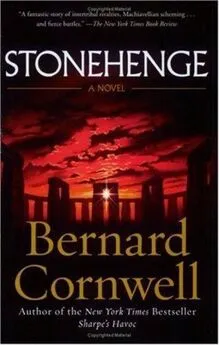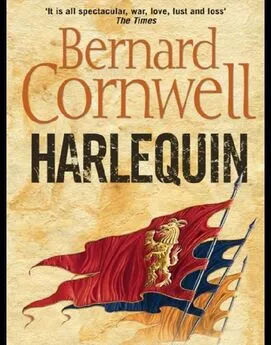Bernard Cornwell - Stonehenge
- Название:Stonehenge
- Автор:
- Жанр:
- Издательство:неизвестно
- Год:неизвестен
- ISBN:нет данных
- Рейтинг:
- Избранное:Добавить в избранное
-
Отзывы:
-
Ваша оценка:
Bernard Cornwell - Stonehenge краткое содержание
Bernard Cornwell's new novel, following the enormous success of his Arthurian trilogy (The Winter King, Enemy of God, and Excalibur) is the tale of three brothers and of their rivalry that creates the great temple. One summer's day, a stranger carrying great wealth in gold comes to the settlement of Ratharryn. He dies in the old temple. The people assume that the gold is a gift from the gods. But the mysterious treasure causes great dissension, both without from tribal rivalry, and within. The three sons of Ratharryn's chief each perceive the great gift in a different way. The eldest, Lengar, the warrior, harnesses his murderous ambition to be a ruler and take great power for his tribe. Camaban, the second and an outcast from the tribe, becomes a great visionary and feared wise man, and it is his vision that will force the youngest brother, Saban, to create the great temple on the green hill where the gods will appear on earth. It is Saban who is the builder, the leader and the man of peace. It is his love for a sorceress whose powers rival those of Camaban and for Aurenna, the sun bride whose destiny is to die for the gods, that finally brings the rivalries of the brothers to a head. But it is also his skills that will build the vast temple, a place for the gods certainly but also a place that will confirm for ever the supreme power of the tribe that built it. And in the end, when the temple is complete, Saban must choose between the gods and his family. Stonehenge is Britain's greatest prehistoric monument, a symbol of history; a building, created 4 millenia ago, which still provokes awe and mystery. Stonehenge A novel of 2000 BC is first and foremost a great historical novel. Bernard Cornwell is well known and admired for the realism and imagination with which he brings an earlier world to life. And here he uses all these skills to create the world of primitive Britain and to solve the mysteries of who built Stonehenge and why. 'A circle of chalk, a ring of stone, and a house of arches to call the far gods home'
Stonehenge - читать онлайн бесплатно ознакомительный отрывок
Интервал:
Закладка:
It took a long while. A surprisingly long while. The old woman kicked and twitched under the furs, but after a while the spasmodic movements ended, and still Camaban kissed her. The fire was almost dead again by the time Sannas's small, birdlike movements had ended, but her eyes were still open and Camaban stared into them until at last, though cautiously, as if expecting a trick, he slowly pulled his face from hers. He waited, his mouth just a finger's breadth from her mouth, but she did not move. And still he waited, scarce daring to breathe, but finally he smiled. 'What a honey-sweet kiss that was,' he said to the corpse, then touched his finger to her forehead. 'I took your last breath, lady. I have stolen your soul.'
He sat for a moment, savouring the triumph. With her last breath he had stolen her power and engulfed her spirit, but then he remembered the closeness of dawn and he hurriedly crossed the hut. He cleared away the stones that ringed the small hearth and then, using a piece of firewood, shifted the burning wood, embers and hot ashes aside. He found a broken antler and used it to dig into the hot soil beneath the hearth, scrabbling the earth away where he knew Sannas hid her most precious possessions.
He uncovered a leather pouch. He prised it gently from the earth's grip, then pulled aside the leather curtain at the hut entrance where the first seeping grey of the morning provided a sullen light. He untied the pouch and spilt its contents on to his palm. There were eleven of Sarmennyn's small lozenges and one large one. It was the gold Hengall had exchanged for Cathallo's stones and the two lozenges Camaban himself had paid to Sannas. He gazed at the treasure for an instant, then returned it to the pouch, tied the pouch to his belt and went out into the cold.
He went north, and a child saw him leave the shrine in the misty greyness but did not raise any alarm. He limped across the frost-whitened fields to the dark woods in which he vanished before the sun rose to blaze across Cathallo's shrine.
Where Sannas the sorceress lay dead.
—«»—«»—«»—
Haragg hired three slave women for the winter. They came from a tribe that lived yet farther north and spoke a language that even Haragg did not understand, but they knew their duties. The youngest slept with Haragg, and Saban and Cagan shared the other two. 'A man should sleep with a woman,' Haragg told Saban. 'It is a natural thing, the proper thing.'
Haragg seemed to take small pleasure from his own woman. Instead his joy came from the spare, cold life of that long winter. Each morning he would go to the temple to pray and afterwards he would bring water or ice to the fire while Cagan fed hay or leaves to the three horses that shared the hut. The chief of the settlement regarded Haragg as an honoured guest and provided food for all of them, though Saban supplemented those gifts by hunting. He preferred hunting by himself, stalking the scarce prey through an ice-bound land, though he did once join the men of the settlement when a bear was found sleeping in a cave. They woke the beast with fire and killed it with flint and bronze and afterwards Saban carried a bleeding haunch of meat back to the hut. There was never quite enough food, at least for the giant Cagan, but none of them starved. They ate berries and nuts that were stored in jars, eked out their bags of grain and herbs, and occasionally gorged on venison, hare or fish.
And day after day the snow glittered on the hills and the air seemed filled with a sparkling frost and the sun came for a short time and the nights were endless. They burned peat, which Saban had never seen before, but sometimes, to make the light in the hut brighter, they would add logs of resinous pine that burned smoky and pungent. The long evenings were usually silent, but sometimes Haragg talked. 'I was a priest,' the big man said one night, startling Saban. 'I was a priest of Sarmennyn, and I had a wife and a son and a daughter.'
Saban said nothing. The peat glowed red. The three horses stamped their feet and Cagan, who loved the horses, felt the vibration and turned and gurgled soothingly to them. The three women watched the men, sheltering under a shared pelt. They had tangled masses of black hair that half hid the scars on their foreheads, which showed they were slaves. Saban was learning their language, but now he and Haragg spoke in the Outfolk tongue.
'My daughter was called Miyac,' Haragg said, staring into the fire's steady glow. It was almost as though he were talking to himself, for he spoke softly and did not look at Saban. 'Miyac' — his voice caressed the name — 'and she was a creature of great loveliness. Great loveliness. I thought she would grow to marry a chief or a war leader, and I was glad, for her husband's wealth would keep my wife and me in our old age and would preserve Cagan when we were dead.'
Saban said nothing. There was a slithering noise from the roof as a mass of snow slid down the roof turfs. 'But, in Sarmennyn,' Haragg went on, 'we choose a sun bride each year. She is chosen in the spring and for three moons' — he rocked his hand back and forth to show that the three moons were an approximation — 'she is a goddess herself. And then, at midsummer, at the sun's glory, we kill her.'
'Kill her?' Saban asked, shocked.
'We send her to Erek.' Erek was the Outfolk's name for Slaol. 'And one year,' Haragg went on, 'we chose Miyac'
Saban flinched. 'You chose her?'
'The priests chose her,' Haragg said, 'and I was a priest. My wife screamed at me, she hit me, but I thought it was an honour to our family. What greater husband could Miyac have than Erek? And so my daughter went to her death and my wife died within a moon, and I fell into a black sadness, and when I came from that sadness I no longer wanted to be a priest and my ideas were unwelcome and so I began to wander the land. I traded.' The sadness showed on his face and Cagan whimpered so that Haragg leaned over and patted his son's hand to show that everything was well.
Saban shifted closer to the fire, dragged the pelt around his shoulders and wondered if the world would ever be warm again.
'My twin brother was the high priest in Sarmennyn,' Haragg said, 'and when I told him I no longer believed in sacrifice he allowed me to become a trader instead of a priest. His name is Scathel. You will meet him, if he still lives.'
Something about the way Haragg said his brother's name suggested that Saban did not want to meet Scathel. 'Is your brother still the high priest?' he asked.
Haragg shrugged. 'He lost his wits when the treasures were stolen and fled into the mountains, so now I do not know if he is alive or dead.'
'Who stole the treasures?' Saban asked.
'His name is never spoken,' Haragg answered, 'but he was a son of our chief and he wanted to be chief himself, except he had three older brothers and all were greater men than he and so he stole the tribe's treasures to bring ill luck on Sarmennyn. He had heard of Sannas, and he believed she could use the treasures to make a magic that would kill his father and brothers and give him the chieftainship. We know that, for he said as much to his woman, and she told us before we killed her, and then Scathel averted the ill luck by killing the chief and all his family. So the gold never did reach Sannas, but Scathel still went mad.' He paused. 'And perhaps the ill luck was not averted, I don't know. What I do know is that my people will do anything, give anything, to have the treasures returned.'
'They must give a temple,' Saban said, remembering what Lengar had told him on the morning of his enslavement.
'They must listen to Camaban,' Haragg said softly, and once again Saban was filled with wonderment that his awkward, crippled brother had suddenly gained such an awesome reputation.
A few days later, when a thaw had melted some of the snow on the passes through the hills and Haragg's precious white pelts had been delivered, and as the days lengthened again as Slaol recovered his strength, Haragg took Saban and Cagan westwards. Ostensibly they went to buy some axes made from black stone that were much prized in the south country, but Saban suspected there was another purpose in the journey. It took half a day until, quite unexpectedly, they reached a high hill that ended abruptly at a sea cliff. This was the first time Saban had ever seen the sea and he whimpered at the sight. He had never imagined anything so dark, grey, cold and venomous. It heaved constantly, as though muscles worked beneath its white-flecked surface, and where it met the land it broke into a myriad wind-whipped fragments, then sucked and drained and surged to shatter again. Shrieking white birds filled the air. He could have gazed at it for ever, but Haragg stirred him northwards along the shore. Monsters' bones littered the small beaches in the cliff bends and, when they came to the settlement that sold the axes, Saban found himself sleeping in a hut whose rafters were made of those vast curved bones that arched above him to support a low roof of wood and turf.
Next morning Haragg took Cagan and Saban to a narrow fragment of high land that jutted into the vast ocean and, at the land's end, atop a cliff that seemed to shake with the endless thunder of the sea, there was a temple. It was a simple enough shrine, a mere ring of eight tall stones, but one stone stood proud of the circle. 'Erek again,' Haragg said, 'for wherever you travel, you will find Erek is worshipped. Always Erek.' The outlying stone, Saban guessed, stood towards the place where the sun rose in midsummer and its shadow would pierce the circle as the sun gave life to the earth. Small sprigs of dead heather lay at the foot of the stones, evidence of prayers made, and not even the skirling sea wind could wholly snatch away the blood stink of a beast that had been sacrificed at the temple not long before. 'We have a shrine like this in Sarmennyn,' Haragg said softly, 'and we call it the Sea Temple, though it has nothing to do with Dilan.' Dilan, Saban now knew, was Sarmennyn's sea god. 'Our Sea Temple doesn't face the rising sun,' Haragg went on, 'but looks to where it sets in midsummer, and if I had my way I would pull it down. I would take its stones and cast them into the sea. I would obliterate it.' He spoke with an uncommon bitterness.
'The sun bride?' Saban guessed diffidently.
Haragg nodded. 'She dies at the Sea Temple.' He closed his eyes for a few heartbeats. 'She goes to the temple arrayed in Erek's gold and there she is stripped naked, just as a bride should go to her husband, and sent to her death.' Haragg hugged his knees, and Saban could see tears on his face, or perhaps that was just the effect of the wind that flecked the sea ragged and whirled the shrieking birds about the sky. Saban understood now why Haragg had come to this high place, because from here he could gaze into the vastness above the sea where his daughter's spirit flew with the soaring white birds. 'The gold was a gift from Dilan,' Haragg went on. 'The treasures were washed ashore in a swamped boat, close to where the Sea Temple stands, and so our ancestors decided the gold was a gift from one god to the other, and perhaps they were right.'
'Perhaps?'
'Boats do get swamped,' Haragg said, 'and traders from the land across the sea do bring us gold.'
Saban frowned at the scepticism in the big man's voice. 'Are you saying…' he began to ask.
Haragg turned on him fiercely. 'I am saying nothing. The gods do talk to us, and maybe the gods did send us the gold. Perhaps Dilan swamped the boat and steered it to that beach under the cliff, but why?' Haragg frowned into the wind. 'We never did ask why, we just wrapped a girl in gold and killed her, and we went on doing it year after year after year!' He was angry now, spitting at the temple stone where the sacrificial blood, stuck with brown hairs, still showed. 'And it is always the priests who demand sacrifice,' Haragg went on. 'From every beast that is killed they get the liver and kidney and brain and the meat of one leg. When the sun bride is a goddess she is given treasure, but who keeps it when she is dead? The priests! Sacrifice, the priests say, or else the harvest will be bad, and when the harvest is bad anyway they simply say you did not sacrifice enough and so demand more!' He spat again.
Читать дальшеИнтервал:
Закладка:


